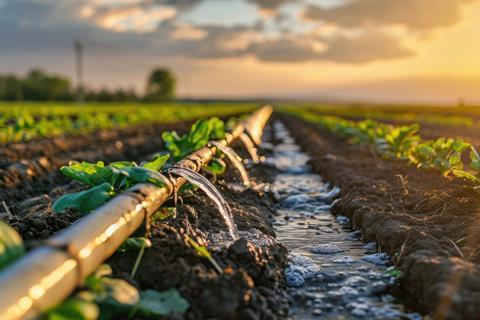Event comes as farmers increasingly experience severe weather events
The NFU has held a multi-agency Water Summit to address the significant challenges that continue to impact farmers’ ability to produce food for the nation, particularly the critical issues of water quality and availability.

Defra secretary Steve Reed was among more than 60 attendees at the event, which included industry experts, water companies, environmental NGOs and supply chain representatives, brought together by the NFU to discuss ongoing concerns.
The summit provided a platform for constructive discussions on the challenges of water pollution, climate change and increasingly unpredictable weather patterns, the evolving regulatory financial pressures and lack of critical investment in water infrastructure. That was all put within the context of the impacts on national food security.
NFU vice-president Rachel Hallos, who hosted the event on her farm in West Yorkshire, said: “Water is our most precious resource. It’s absolutely vital to producing the food our country needs.
“But we’re facing increasing pressures on water, be it resources, flooding, or quality. Whether it’s from vital nutrients that we use to grow food impacting water quality in rivers often from agricultural runoff or the cycle of drought and floods leading to poor harvests, it all undermines the stability and resilience of our farming businesses and ultimately impacts our food security.”
Hallos pointed to a survey of NFU members that reveals nearly two-thirds have experienced a severe weather event in the past 10 years that has affected their farming business in some way.
“Now’s the time to start having open and honest conversations and treating water as a national strategic priority,” she continued. “For our part, that means rolling our sleeves up, taking the initiative and tackling these challenges head on.
“At the NFU, we have made actionable pledges for farmers to implement on the ground and we will work in partnership with the industry, to do what we can. But we cannot do it alone. We need everyone to start thinking about what we can each individually and collectively do and what will make a real difference.”
During the event, three breakout sessions were held looking at issues of investment, innovation and circular economy. An overriding message from attendees was the need for urgent investment in water infrastructure, as well as access to robust data and better planning systems that supports necessary infrastructure improvements on farms for slurry storage and reservoirs.
The NFU noted that it was also encouraging to hear from Reed that he will look at further actions within the updated Sustainable Farming Incentive (SFI) that will help farmers reduce water pollution.
“This week’s summit was just the start,” Hallos said. “These conversations must continue so we have a joined-up approach that allows us to collaborate better with government, local authorities, environmental NGOs, the supply chain and water companies, and ensures farmers have access to a clean supply of water to produce sustainable food for the nation and prioritises UK food security as national security.”



